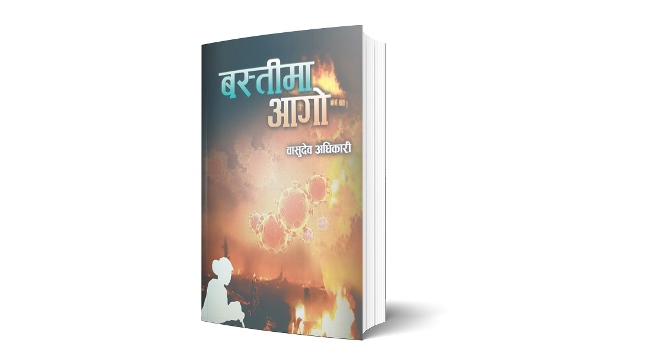Living With Coronavirus

Modnath Dhakal
Any work of literature is a history in part as it not only expresses the feelings and opinions of the writer but also portrays the contemporary status of the society as well as the socio-economic, cultural and political environment in which s/he has lived. Emotions and feelings or even the logics are subjective to every human's own experience of worldly affairs. While many just feel it and forget and some articulate it to others, a handful of them records them, and that often becomes a piece of literature. What do we experience in the creations of Shakespeare, Jules Verne, Laxmi Prasad Devkota and Krishna Dharabasi? They are all about the portrayal of their contemporary time, people and society.
Poet Basudev Adhikari has put his efforts to paint the picture of Nepali society during the coronavirus pandemic through 61 poems and presented them in a package with the title 'Bastima Aago' (fire in the village). Probably, this is the first book written by a Nepali writer that is entirely about the coronavirus pandemic and its impact on people such as employees, professionals, students, workers and housewives; and on economy, nature, human relations and humanity. Many years later, people would see the troubles and challenges that the people in countries and the world underwent during the deadly pandemic that brought the entire human activities to a standstill.
Now I see
Simple corona
Crossing the immigration
and travelling around the world.
(Simple Corona)
Poet declares he will win coronavirus pandemic without touching anything, the disease will win if it gets a chance to touch him. He keeps his guest outside the home, asks to wash his hands with soap, offers sanitiser and says 'hugging is prohibited'. He expresses concerns over the crowds at the market places and is worried the war against the COVID-19 wouldn't be won should people continued with their negligence and indifference to the safety protocols. Readers can find the amalgamation of fear, worry, concern, advice and willingness in the poems. The poet has personified the coronavirus and lockdown and addressed the latter as his beloved – he has maintained it in all poems except for a few. Readers can relate their experiences to the poems in the book.
Adhikari uses 'bird' as a metaphor for the workers and describes their hardships through the story and challenges of a bird that has to go far away to collect food for its offsprings.
But one day the forest catches fire that expands exponentially engulfing the trees and the surroundings in smoke, some birds die and many get injuries. The poet wants to make the birds return to their nest but doesn't know how to persuade them to do so.
Millions of workers lost their job temporarily or permanently finding themselves helpless as the lockdown and restrictions continued for about four months. Nepali migrant workers who had returned from India risking their health and life during the initial days of lockdown had been queuing up at the Nepal-India border to go back on the eve of the great festival season. They are the birds going far away to find food for their families.
Economic challenges and concerns have found their ways in the poems of Adhikari who has served as the Executive Director of the Nepal Rastra Bank and is Chairman of Nepal Bank Limited, the first bank in the country. However, he has minutely observed contemporary politics and governance and expressed the feelings in clear terms. It can be illustrated by the two pieces of poems presented below. The poem 'Besar Mahatmya' picks the recent hubbub about the use of turmeric to save oneself from the coronavirus disease. When Prime Minister KP Sharma Oli made this statement a couple of months, the entire society was divided over turmeric.One set supported the PM's idea about turmeric and another went againts it. Adhikari has expressed satire to the politics using turmeric as a metaphor.
Our score card details:
A-plus in destruction
A in brouhaha
C-minus in management. (Sambedana)
The old man with idioms
Bowled us out with turmeric 'Purana'
To eat or not to eat?
Take it to the kitchen
Or hurl the curcumin out?
Oh kids,
Ask your mom to use
A pinch of turmeric powder
Not the curcumin. (Besar Mahatmya)
Nepal's neighbour India had clandestinely built a road up to the Chinese border through Nepali territory in the Kalapani area. India's military has been occupying the area for more than five decades and shows no intention to leave the Nepali land. Adhikari asks a question of why the landlords always wanted to rob the property of the poor.
I amaze
Why a landowner
Eyes a land plot of the poor?
Why many leaders of the village
Like the spit of their masters?
(Mato Chori)
The book is the literary record of individual and public life, economic downturn, job loss, Indian encroachment of Nepali land, the creativity of people, nationalism, politics, technology and social maladies during the coronavirus crisis. Although you can read it in a single sitting, it would leave many questions in your mind that will continue to shake you for quite a time afterward.
@ModDhakal
Recent News

Do not make expressions casting dout on election: EC
14 Apr, 2022
CM Bhatta says may New Year 2079 BS inspire positive thinking
14 Apr, 2022
Three new cases, 44 recoveries in 24 hours
14 Apr, 2022
689 climbers of 84 teams so far acquire permits for climbing various peaks this spring season
14 Apr, 2022
How the rising cost of living crisis is impacting Nepal
14 Apr, 2022
US military confirms an interstellar meteor collided with Earth
14 Apr, 2022
Valneva Covid vaccine approved for use in UK
14 Apr, 2022
Chair Prachanda highlights need of unity among Maoist, Communist forces
14 Apr, 2022
Ranbir Kapoor and Alia Bhatt: Bollywood toasts star couple on wedding
14 Apr, 2022
President Bhandari confers decorations (Photo Feature)
14 Apr, 2022










